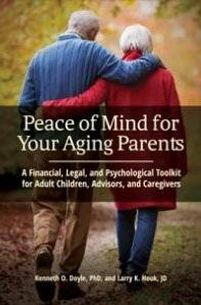How to Work With Aging Parents and Their Belongings
A new book has legal, financial and psychological advice for families
Editor's note: This is an excerpt (with an introduction from the authors) from the book Peace of Mind for Your Aging Parents: A Financial, Legal and Psychological Toolkit for Adult Children, Advisors and Caregivers, published this month by Praeger.

Passing favorite belongings along to the next generation can be tricky because it often involves much more than economic value. Mom’s favorite chair is not just a chair, it’s the memory of Mom cuddling her children in it. The lake place is not just a building and a beach, it’s the memory of many good times past.
In this excerpt from our book, Peace of Mind for Your Aging Parents, we describe the use of handwritten lists of tangible personal property to deal with simple items like furniture and personal effects. In this excerpt, we address more complicated belongings like antiques, collectibles and the summer cottage.
What About Our Parents’ Antiques and Collectibles?

If your parents are collectors, the collection might present some special problems. Like other items of personal property, the collection may have more sentimental value than financial value. It may also have more value to the collector than to anyone else.
Sometimes it’s better financially to break up the collection and sell the items individually, but other times it’s more profitable to sell the collection intact. You can watch many stories of these sorts on the TV show Strange Inheritances. As you can imagine, breaking up a collector’s life’s work is likely to bring out all kinds of feelings.
If your parents have a collection that they think is valuable, the prudent thing to do is to have it appraised and give their executor the names of people they would trust to dispose of it properly.
If a family member would like to have the collection, your parents should treat it like tangible personal property: make and date a handwritten list and store it with their will. They might even go so far as to explain the reason for the gift, as perhaps their estate is distributed less than equally.
Two types of collections require special attention. The first involves big-ticket items: cars, trucks, farm tractors, airplanes and the like. These are probably too valuable to dispose of through a list of tangible personal property. Your parents should make sure their lawyer knows about the collection and factors it into their overall estate plan.
The second type involves firearms. There are a lot of restrictions on the transfer of “normal” firearms, and there are even more on special items like Tommy guns. If you’re the executor, be sure to find out which regulations you have to follow.
What About Our Summer Cottage?
More and more families are setting up trusts or corporations to own and operate these properties.
Trusts. You can create a trust for the sole purpose of owning and operating the property. The trustee would be responsible for keeping the place up, paying taxes, insurance and other expenses, and making periodic reports to the family. It’s best to have an independent trustee, because naming an heir as trustee could result in additional family stresses.
The trustee will need some money to pay the bills. Ideally, your parents or their estate would fund the trust so the bills could be paid from investment earnings. More realistically, there may have to be regular assessments from the heirs, which could, of course, present all kinds of problems: What to do if one of you can’t or won’t pay? What if some of you get to use the property more often than the others do? Should the ones who use it more pay more?
In some states, trusts enjoy perpetual existence, but in most, it’s less than that, commonly 99 years. This is generally an issue only if you’re trying to plan for multiple generations down the line. Planning for future generations also means that someone needs to fund the trust for future expenses.
Corporations and Similar Entities. The most common kind of entity for owning the family vacation property is the limited liability company (LLC), although sometimes corporations of various sorts could be preferable.
In a nutshell, your parents or their executor could set up the LLC. Each heir would receive some portion of the stock, signifying ownership. The board of governors would establish rules for the use of the property and withdrawal of shareholders or members, and also perform the same services a trustee would. In addition, the board would assess the shareholders to make sure the LLC had the money it needed beyond any initial funds your parents would have provided.
Under this approach, it is important to consider who should serve on the board of directors or governors. Should it be all of the heirs? Should it be only those who have an active interest in the property? Should it be the ones with the best aptitude for the job? The answer lies in the ability of whatever group is selected to be able to work together toward a consensus, versus being in constant contention with each other. If necessary, an “outsider” could be named to avoid deadlocks.
The rules could spell out what to do if some of the shareholders or members want to withdraw, e.g., let the other shareholders or members buy those shares at an independently appraised price. In addition, because these entities live until the members decide to end them, shareholders can easily pass their shares on to their children and grandchildren.
Other structures have their own advantages. For example, certain kinds of trusts could let your parents or some heirs use the property for the rest of their lives and still keep it out of their estate.
Finally, if the property is located in a state other than the one in which your parents live, it’s even more important to plan ahead to make sure the estate won’t have to be probated in more than one state.

